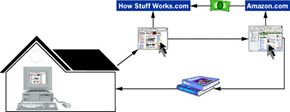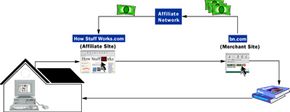Amazon.com's affiliate program is so successful because it effectively links commerce and content and takes advantage of the respective strengths of Amazon.com and its affiliates. All kinds of people might buy books online, because there are books on a huge number of subjects. By itself, Amazon.com can attract a lot of these people, but there are many more readers who surf the Internet but wouldn't think to go shopping at Amazon.com. Either they haven't heard of it or the lure of books alone does not entice them. Some other subject, let's say car engine repair, does entice such a reader, however, and so he seeks out Web sites covering that subject. If his favorite engine repair Web site were to recommend and offer a good engine repair book, he would happily purchase it online. If that Web site sends him to Amazon.com to buy the book, Amazon.com gains a customer it may never have had without the referral. If the customer is happy with their purchase and the service they receive, he might also buy more books on the site.
So, is the engine repair Web site getting the short end of the stick here? Not at all. The engine repair Web site is a small operation and its creators' main interest is writing articles about engines. If you've read the HowStuffWorks article How E-commerce Works, then you know selling products online takes a lot of time and money. For a site that doesn't want to spend its resources selling books but knows its audience would be interested in them, Amazon.com's affiliate program offers an attractive arrangement. Effectively, the affiliate Web site gets to make money selling books but doesn't have to deal with any of the work involved in the process. All the webmaster has to do is pick a book she wants to sell and incorporate it into her Web site.
Affiliate programs work best when affiliates choose products, services and companies that match the content of their Web site and would interest their readers. If a content Web site chooses affiliate programs well, everybody involved in the process wins. The affiliate wins because it is able to sell products to its visitors without having to run an e-commerce business, the merchant site wins because the affiliate sends it customers it wouldn't get otherwise, the affiliate network wins because it gets a piece of the profit for setting everything up, and the Web surfer wins because the affiliate Web site directs her to products she would be interested in, which she can then purchase easily.
You probably won't make much money as an affiliate if you choose affiliate programs that don't have much to do with your site. Because it is usually free, a lot of Web sites join a whole bunch of affiliate programs and figure that enough of them will pay off that they'll make some money. Probably, they'll actually end up canceling each other out: the affiliate Web site will just look like a huge advertisement. Your main assets as a content Web site are your content, your traffic and your knowledge of that traffic, so it's a much better strategy to use the information you have and pick affiliate programs that would best serve your visitors and best supplement your content. If the programs you choose match the content of your site, it should be fairly easy to lead your visitors to participate in them. If you've reviewed a CD on your site, for example, you could simply link to the page selling that CD on an online music store's site. This is an excellent way both to serve your visitors and to make money off your Web site's traffic.
For more information about affiliate programs and related topics, check out the links on the next page.




